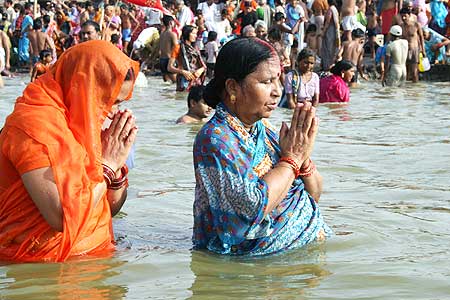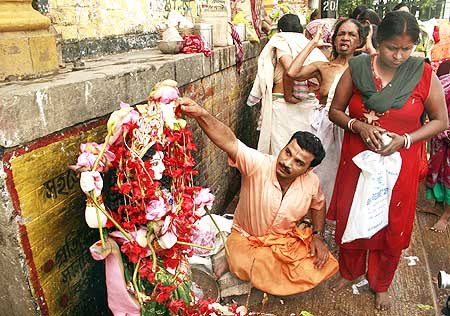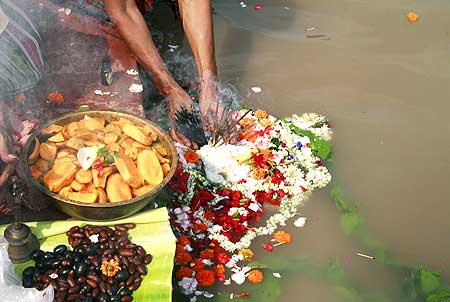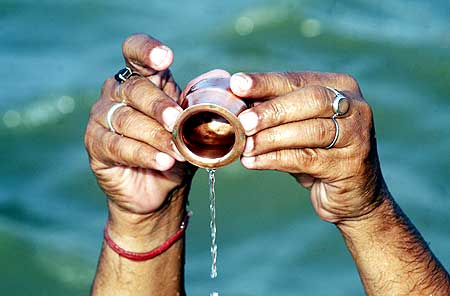Photographs: Jitendra Prakash/Reuters
In June, the lifeline of North India and the most-worshipped river, the Ganges' descend on earth is celebrated.
The Ganga, largest of India's rivers and the most sacred to Hindus, holds a unique place amongs Indians. It is regarded as a celestial river originating in the heaven; she is worshipped as the mother who washes away all sins of mankind.
The first 10 days of the month Jyeshtha, known as Dashahara, are dedicated to honour the river Ganges. It is believed that if one offers prayers on this day, one attains salvation from 10 sins. The festival's name Dussehra is derived from 'Dus' which connotes ten and ' hara' which means defeat. Thus the festival is called Ganga Dusshera.
Ganga descends on earth!
Image: A Hindu priest prays in front of a statue of the river goddess Ganga on the banks of the Ganges during thePhotographs: Jayanta Shaw/Reuters
The legend goes King Sagara of the Ikshvaku dynasty ruling at Ayodhya had two queens, Keshani and Sumati, but neither had a child. Sagara performed severe austerities before his wives could produce sons. Keshani gave birth to a son called Asmajas, Sumati bore 60,000 sons. Sagara performed the Ashwamedha sacrifice to declare his might over the neighboring kingdoms. According to the prevalent custom, the sacrificial horse were let loose and allowed to wander into the neighboring kingdoms.
If the horse was caught, a battle ensued and the outcome decided the winner. The 60,000 sons of Sagara were following the horse when they saw him enter a cavern where sage Kapila was meditating. Not seeing the horse in the cavern, they presumed that Kapila had captured it. They started disturbing his meditations. Annoyed at being disturbed, Kapila with a curse burnt the 60,000 sons of Sagara.
Time passed and later Bhagiratha, the great grandson of Sagara, chanced to come across the bones of his dead ancestors. He wanted to perform the shraddha (last rites) of his ancestors but there was no water available for the ceremony. Agastya having drunk all the waters of the ocean, the country was passing through a severe drought. Bhagiratha prayed to Brahma, the Creator, to end the drought. Brahma asked him to pray to Vishnu to allow Ganga that was sourcing from his toe, to come down to earth.
Vishnu when prayed to by Bhagiratha agreed and requested Lord Shiva to allow the torrential rain to fall on his head before it came to the earth as the river was very forceful and her fall would split the earth. Shiva agreed to take the gigantic weight of the cascading Ganga on the matted hair piled high on his head. This ensnared and delayed the progress of the river and flowed to the plains bestowing its waters on the parched earth.
Ganga descends on earth!
Image: A priest prays to the river goddess Ganga on the banks of the GangesPhotographs: Jayanta Shaw/Reuters
The river is worshipped during the 10-day festival, particularly by people of Uttar Pradesh, Bihar, and West Bengal through which the river flows. Devotees flock to Rishikesh, Haridwar, Garh-Mukteshwar, Prayag, and Varanasi to meditate and take a holy dip. They take the river clay home to worship.
Ganga descends on earth!
Image: A devotee prays after taking a dip in the SangamPhotographs: Jitendra Prakash/Reuters
In the evening, thousands of leaf boats laden with flames, flowers, and sweetmeats are offered to the river and they flow with the current to the sounds of the bells and bhajans, kirtans and shlokas recited during the Arati.
On this day, if a devotee is unable to visit and bathe in the river Ganga, then Ganga jal (water) kept in most Hindu homes is used for purification.
A bath in the river is said to purify all sins.





article